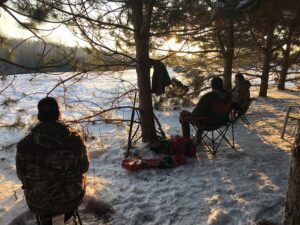Fort William journalist in running for a national award

By Rick Garrick
THUNDER BAY — Fort William journalist Jolene Banning is in the running for a national award after being recognized with a 2022 RTDNA Canada Central Region award for Excellence in Sound (Audio) on May 26. Banning was recognized for her CBC Thunder Bay Stories from Anemki Wajiw column, Out on the land for a spring goose hunt. The RTDNA Canada Best Canadian Local News Award national awards will be announced at RTDNA Canada’s Awards Gala in Toronto on June 11.
“It’s from the spring goose hunt of 2021 and I went out with [Nishnawbe Aski Nation Grand Chief] Derek Fox, Nodin McKenzie and Randall Crowe,” says Banning, columnist with CBC Thunder Bay. “They all had different ranges of hunting skills and hunting supplies. Derek had the majority of the supplies because Thunder Bay is his home base, the other two young gentlemen were from up north [in Nishnawbe Aski Nation] territory where at springtime you would be normally doing a goose hunt.”
Banning says the hunters set up goose decoys on the land and watched for geese flying overhead from their blind.
“They were all done up in their camo, they had their gear all ready, they had their seats all set up and their drinks and their food and their tools for doing their goose calls,” Banning says. “Nodin would do the calls when they saw the geese flying overhead, so the geese would look down and see the decoys.”
Banning says some of the geese circled around the area when they heard the goose calls, but continued onwards.
“It was very exciting — I really thought we were going to get one a couple of times because they had flown overhead, Nodin had done the call, the geese had done the call back to say we hear you, we see you, they had sort of flown in a circle but when they flew in a circle … they kept on going,” Banning says. “On that goose hunt, we were unsuccessful. They went out the following day without me because I had already gotten my story … and got a whole bunch [of geese].”
Banning says the Stories from Anemki Wajiw series is about people connecting back with the land, including by trapping, hide tanning, fishing and the goose hunt.
“For me, I started connecting back with Anemki Wajiw when I started tapping sugar maples,” Banning says. “It was such an amazing feeling, it felt so great to be doing things that my ancestors did, to be looking for knowledge that my ancestors had. I thought I can’t be the only one doing this and I pitched the idea to a producer at CBC Thunder Bay.”
Banning says she started the Stories from Anemki Wajiw series with five columns and has since done another five columns.
“It’s important to do this kind of work because for far too long the stories told about us were always told [by non-Indigenous] people,” Banning says. “They didn’t have the same understanding of our knowledge that we do, they didn’t see the importance of our connections to land, our connections to animals. It’s important for me to tell these stories because there’s so much knowledge in the land and it’s really needed right now — we’re in the middle of a climate crisis, people are looking for their identity and they should know who they are and where they come from.”
Banning says media plays a big role in educating and informing the public.
“If we don’t tell our stories from our point of view centring our original Indigenous Anishinabe knowledge, then other people are allowed to tell the story and paint us in any picture they want,” Banning says. “That’s why we need to be the ones to tell these stories.”
Banning’s award-winning column is posted online.

